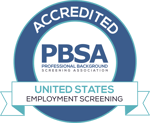 When running a background check, it may be surprising what has great impact on the results of your search and what could put you at risk.Here’s some of the most common and impactful background screening oversights we see… from compliance to executing the search! To take it a step further, you can use this list along with a discussion with your Account Exec to establish your own Best Practices for Background Screening!
When running a background check, it may be surprising what has great impact on the results of your search and what could put you at risk.Here’s some of the most common and impactful background screening oversights we see… from compliance to executing the search! To take it a step further, you can use this list along with a discussion with your Account Exec to establish your own Best Practices for Background Screening!
- Not using a consent form at all or using one that is not compliant. The Fair Credit Reporting Act (FCRA) is clear on this – you need a consent form for every background check. Following a number of class action lawsuits totaling well into the millions, it is more important than ever to always use a compliant consent form, signed by the applicant before conducting any portion of the background check. Don’t forget, a compliant form cannot be mingled in with the rest of an application!
- Omitting Adverse Action Letters from your background screening practices. If your decision not to hire, promote, or take on as a tenant, is based all or in part on the results of the background screen, you must follow the Adverse Action process. Similar to consent forms, a number of employers, property managers and landlords paid a pretty penny for not following through with pre-adverse action and post-adverse action, did not allow the proper amount of time between the notices or only provided one of the two required letters. Certain locations, such as NY City, require additional documentation during Adverse Action.
- Not providing your applicant with a copy of their background check when requested. According to the FCRA, your applicant is entitled to a copy of their background report when requested. Withholding or refusing to provide someone a copy of their background results not only violates this law but prohibits them from the ability to file a dispute, another FCRA right.
- Running a background checks that vary by individual instead of position. Different positions may require different services. For example, running a sex offender registry for someone in contact with vulnerable populations as opposed to the professional license verifications you run for your in-house accountant. Picking and choosing services based on what pertains to the job at hand is OK, as long as you run the same services for everyone applying for the same job. On the other hand, if you run alias name searches only on females because of maiden names, you are treating a protected class different from others making you vulnerable to discrimination allegations.
- Overlooking typos in your search request. One of the easiest ways to miss criminal records, receive incorrect or incomplete results and increase the turnaround time of your background screen request is by allowing typos to slip through the cracks. From the spelling of a name, to transposing numbers in the SSN or DOB, to the correct current address and zip code, be sure all information provided is 100% accurate!
- Providing incomplete information on your applicant. Especially when running criminal searches, every piece of information you can provide has value. Courts can document any identifiers they please on a court record. Although many are matched based on name and date of birth, we frequently use address history, driver’s license number and occasionally a professional license or SSN as a second identifier. Needless to say, the more information you provide, the better your background check results!
- Omitting middle name, especially when your applicant has a common name. The middle name can be just as important as a first and last name when it comes to criminal and civil record searches. Our researchers can move through records with greater efficiency when a middle name is provided – common or not!
With all this in mind, it’s important to review your processes and procedures for background screening your employees and applicants on a regular basis – annually is usually a good rotation. This will give you a chance to double check you’ve caught up with all new legislation, identify any possible gaps or practices that could impact the success of your screens.
To make it easier, you can subscribe to our blog and follow us on LinkedIn!
On a final note, it’s important to realize this is not all encompassing… We can’t act as your attorney or give you legal advice so make sure you’re working with a qualified employment attorney. We can, however, talk to you about your background screens and help identify some vulnerabilities as well as take a gander at your searches – maybe there’s room to improve! If you’d like a further in depth conversation about your background checks, contact us!


